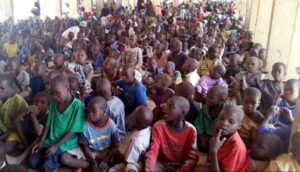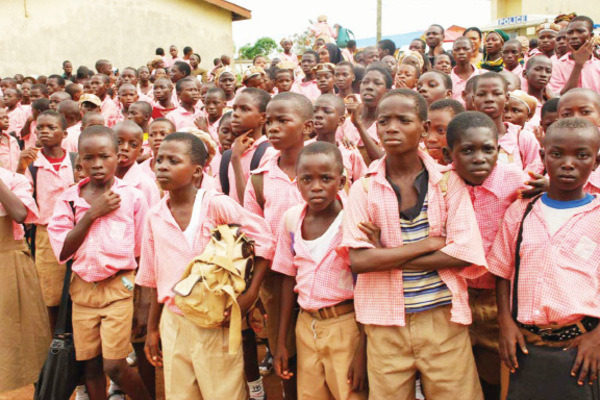The ongoing crises in Northeast Nigeria have deprived a significant number of children of their fundamental right to education. Despite years of humanitarian efforts, access to education remains a formidable challenge, particularly for internally displaced children, both within camps and those living in host communities. Schools in these communities are severely strained, lacking the capacity to accommodate the influx of displaced children.

According to the International Organization for Migration (IOM) mobility tracking report from 2023, approximately 2.2 million people are displaced across the BAY states (Borno, Adamawa, and Yobe), with 52 percent being school-age children (3-17 years). Alarmingly, the report highlights that 32 percent of these children have never received any form of education. In 157 camps and camp-like settings, there were no education activities, leaving countless children without the opportunity to attend school.
Poverty-stricken is a key driver of this crisis. Many children are forced to forego education to support their families’ incomes. The worsening economic conditions and rising cost of living further limit access to education for crisis-affected parents. The 2023 Multidimensional Child Poverty Measurement study indicates that older children (15-17 years) experience greater schooling deprivation compared to younger children (5-14 years), due to their increased involvement in family livelihoods.
Gender norms also play a detrimental role, promoting early marriage and childbearing. Simultaneously, communities, teachers, students, and parents have lost trust in public schools to provide safe learning environments and quality services, further reducing demand for public education. Insecurity around schools and the occupation of school buildings in the three states create significant barriers to education access.
The education sector in Northeast Nigeria faces a combination of existing gaps in response mechanisms and inherent weaknesses in public education services. This Joint Education Needs Assessment (JENA) aims to improve the availability of data and evidence to support strategic planning, response, and preparedness for education in emergencies (EiE) actors at the country level. EiE interventions not only uphold children’s right to education but also contribute to protection outcomes by providing access to lifesaving services through schools and learning spaces, such as school feeding, nutrition, health, and psychosocial services. Classrooms serve as critical spaces to convey life-saving messages, support foundational skills learning (literacy, numeracy, and social-emotional learning), raise awareness, and promote behavioral changes.
Furthermore, classroom settings offer a space to identify protection needs and mitigate risks. The 2024 Nigeria Humanitarian Needs Overview reveals that access to education for school-aged girls and boys is hindered by complex challenges, including poor and unsafe school infrastructure, inadequate WASH facilities, insecurity, attacks on educational facilities, a shortage of teachers, and lack of premises adapted for children with disabilities. These challenges affect different population subsets in various ways. Girls are at higher risk of early marriage, while boys face forced recruitment by armed groups.
The JENA was conducted by the Education in Emergencies Working Group (EiEWG) and its partners in Northeast Nigeria, with support from the Global Education Cluster. EiEWG partners played a crucial role in data collection for this assessment, which also received support from the REACH initiative. The primary objectives of the assessment were to prioritize geographical areas for intervention, produce recommendations for informed operational strategies and decisions, and collate field evidence on the current context of education in Northeast Nigeria.
By addressing these challenges, stakeholders aim to ensure that every child has the opportunity to receive an education, even in the most challenging circumstances. This effort is crucial not only for upholding children’s rights but also for fostering stability and development in the region.




